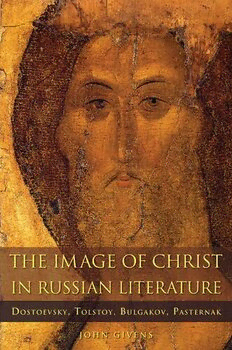
The Image of Christ in Russian Literature: Dostoevsky, Tolstoy, Bulgakov, Pasternak PDF
Preview The Image of Christ in Russian Literature: Dostoevsky, Tolstoy, Bulgakov, Pasternak
THE IMAGE OF CHRIST IN RUSSIAN LITERATURE THE IMAGE OF CHRIST IN RUSSIAN LITERATURE D , t , B , P ostoevsky olstoy ulgakov asternak JOHN GIVENS nIu Press / DekalB, Il Northern Illinois University Press, DeKalb 60115 © 2018 by Northern Illinois University Press All rights reserved Printed in the United States of America 27 26 25 24 23 22 21 20 19 18 2 3 4 5 978-0-87580-779-9 (case) 978-1-60909-238-2 (e-book) Book and cover design by Yuni Dorr Library of Congress Cataloging-in-Publication Data is available online at http://catalog.loc.gov For Anna and Will In memoriam Marian and Calvin Schwenk C ontents aCknowleDgments ix INTRODUCTION The Image of Christ and Russian Literature 3 CHAPTER ONE The Century of Unbelief 16 CHAPTER TWO Christ outside the Truth 40 CHAPTER THREE A Narrow Escape into Faith 59 CHAPTER FOUR Loving Those Who Hate You 83 CHAPTER FIVE “Can This Be Faith?” 102 CHAPTER SIX The Century of Belief 124 CHAPTER SEVEN “Keep in Mind That Jesus Did Exist” 149 CHAPTER EIGHT “Emphatically Human, Deliberately Provincial” 177 CONCLUSION Post-Stalin and Postmodern Christs 205 notes 221 BIBlIograPhy 253 InDex 269 a CknowleDgments The impetus behind this project emerged from conversations I had with a for- mer Catholic priest about the relationship between the quest for the histori- cal Jesus and the Christ of faith in Mikhail Bulgakov’s novel, The Master and Margarita, which I was teaching for the first time in my Soviet literature class. Though the historical critical method of biblical scholarship and aspects of Western and Eastern Christology occupied many of our conversations, our dia- logue began with one of the first questions Woland asks his two atheist interloc- utors on that park bench at Patriarch’s Ponds: the question about the five proofs of God. Curiously, neither of the two most recent and well-regarded translations of the novel had any annotations explaining what these proofs were, though presumably many readers might not know who authored them or be able to recall them. My interlocutor could, and without any prompting elaborated on them at length. That priest was my stepfather, and in listening to him recount Thomas Aquinas’s Five Ways and in talking with him about what Bulgakov was up to having the devil not only insist on God’s existence but that of Jesus as well, I realized I had found an endlessly fascinating subject. Calvin Schwenk, a priest forever in the line of Melchizedek, is thus this study’s most important inspira- tion and guiding light, though he did not live to see its completion. I offer this book in his memory and that of my mother. I have many other debts to acknowledge, large and small. My colleague, Anna Maslennikova, formerly of Saint Petersburg State University, carefully read every page of my manuscript and offered innumerable insights and suggestions as well as constant support throughout the writing process. Her comments and those of my anonymous readers were crucial in honing my arguments and sav- ing me from missteps and I thank them all for their valuable critical interven- tions. Other important readers of this manuscript include Gary Saul Morson and Kathleen Parthé, who provided many helpful and insightful comments at different stages of writing and revision. My book is better for the contributions of all of these thoughtful commentators, though any mistakes that persist are strictly my own responsibility.
